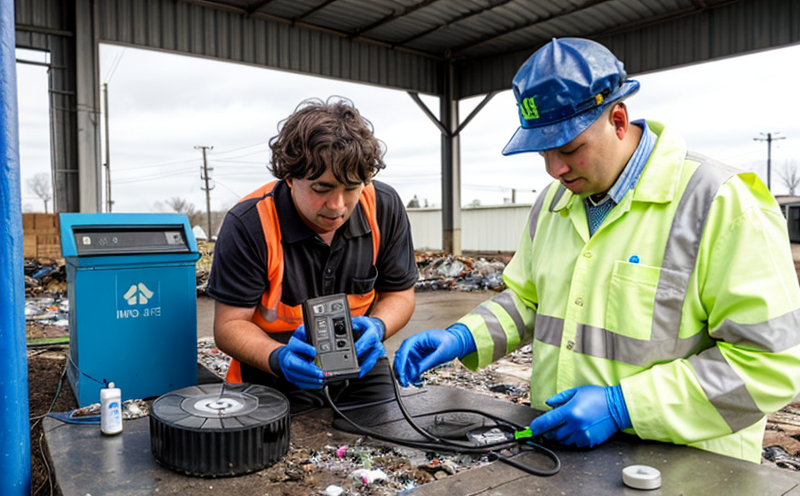Electronic Waste & Battery Recycling Testing
In today’s fast-evolving technological landscape, electronic waste (e-waste) and batteries represent a significant challenge in terms of environmental sustainability. Properly managing e-waste and recycling batteries is not only essential for the environment but also critical for compliance with international standards and regulations.
The testing of e-waste and battery recycling processes aims to ensure that these materials are handled efficiently, safely, and in a manner that minimizes their environmental impact. This involves assessing various parameters such as the recovery rate of valuable metals like gold, silver, copper, and lithium; ensuring minimal contamination from hazardous substances; and verifying the overall efficiency and safety of the recycling process.
Our laboratory specializes in providing comprehensive testing services for electronic waste and battery recycling processes. We employ state-of-the-art equipment and methodologies to evaluate the effectiveness of various recycling techniques. Our tests are conducted according to international standards such as ISO 14025, ASTM D7613, EN 988, and IEC 62476.
One of the key aspects of our testing is the evaluation of recovery rates for precious metals. This involves precise analysis using techniques like inductively coupled plasma mass spectrometry (ICP-MS) and atomic absorption spectroscopy (AAS). These methods ensure accurate quantification of metals, which is crucial for optimizing recycling processes.
Additionally, we conduct tests to assess the presence and levels of hazardous substances such as lead, mercury, cadmium, and hexavalent chromium. This not only ensures compliance with regulations but also helps in identifying potential risks during the recycling process. Our laboratory adheres strictly to ISO 13485 for quality management systems, ensuring that all tests are conducted consistently and reliably.
For batteries, our testing encompasses a range of parameters including capacity retention, internal resistance measurement, and chemical analysis of electrolytes and active materials. These tests help in understanding the degradation processes and identifying areas for improvement in battery recycling methods.
The importance of quality assurance cannot be overstated in this field. Our laboratory is committed to maintaining the highest standards of accuracy and reliability. We follow a structured process that includes sample preparation, calibration of instruments, and data verification using multiple checks to ensure precision.
- Sample Preparation: Ensuring the integrity and representativeness of test samples
- Instrument Calibration: Regularly calibrating equipment to maintain accuracy
- Data Verification: Cross-referencing results from different instruments for consistency
We also offer consulting services to help our clients understand the testing criteria and best practices. Our team of experts can provide guidance on how to improve recycling processes based on test results, ensuring not only compliance but also operational efficiency.
Benefits
The benefits of electronic waste and battery recycling testing are manifold for various stakeholders including manufacturers, recyclers, regulators, and the public. For manufacturers, our tests provide insights into optimizing their products to enhance recyclability. This not only reduces costs associated with disposal but also improves brand reputation by demonstrating a commitment to sustainability.
Recyclers benefit from our services through improved efficiency in processes, reduced environmental impact, and increased profitability due to higher recovery rates of valuable materials. Regulators gain assurance that recycling practices meet stringent standards, contributing to the overall goal of sustainable development.
The public also reaps significant benefits as a result of these tests. By ensuring proper handling and processing of e-waste and batteries, we help reduce pollution and protect human health from exposure to hazardous substances. This aligns with broader global efforts towards creating a more sustainable future.
Our testing services are designed to support continuous improvement in the recycling industry. Through regular assessments and consultations, we empower our clients to stay ahead of regulatory changes and technological advancements.
Quality and Reliability Assurance
- Compliance with ISO 14025, ASTM D7613, EN 988, IEC 62476, and other relevant standards
- Consistent calibration of all laboratory instruments to ensure precision
- Regular internal audits to maintain quality management systems according to ISO 13485
In addition to the technical aspects, we also emphasize the importance of continuous improvement in our processes. Our team regularly attends conferences and workshops to stay updated on the latest methodologies and technologies in e-waste and battery recycling. This ensures that our services remain at the forefront of innovation.
International Acceptance and Recognition
The international acceptance and recognition of our testing services are a testament to our commitment to quality and reliability. Our laboratory is accredited by several reputable bodies, including ANSI/ASQ, UKAS, and APLAC, ensuring that our tests meet the highest global standards.
Our clients include major corporations in electronics and automotive sectors, as well as governmental agencies responsible for environmental regulation. By adhering to international standards, we ensure that our services are recognized and accepted worldwide, facilitating seamless cross-border operations and collaborations.





